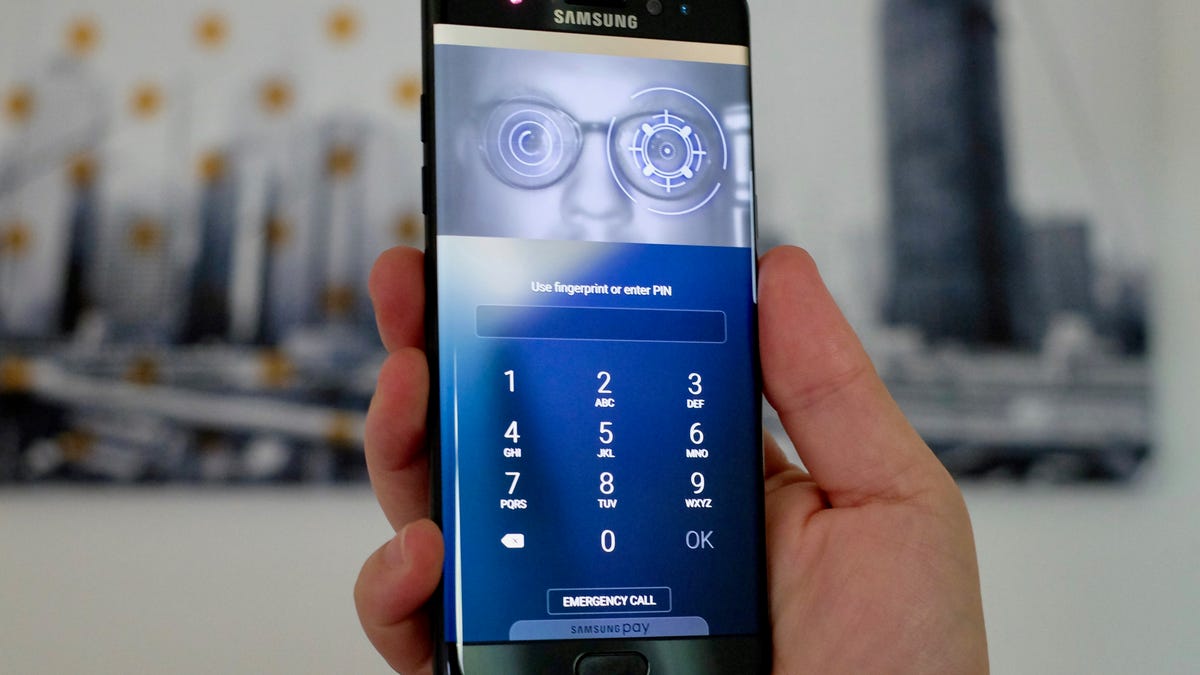Your eyes will unlock tighter security for your phone
Looking forward, iris scanners could be as common as fingerprint sensors on phones.
Your eyes are more than just a window to your soul. They may be the window to your phone, too.
Future passwords could be more secure than anything you type, and all you'll have to do is look at your device's iris scanner to unlock it.
Your eyes would serve as a more secure form of biometric security than your fingerprints, which hackers have been known to fool with high-resolution photos. The goal of all biometrics is to spot what's unique about you. That includes the pores in your skin, the sound of your voice, the shape of your face -- and the patterns in your iris or the blood vessels in the whites of your eyes.
You've already seen them in the blink-or-you'll-miss appearance and disappearance of Samsung's Galaxy Note 7, the first mainstream phone to come equipped with an iris scanner. Apple is rumored to be working on an iris scanner for its 2018 iPhone.
Apple's timing may be onto something. Sy Choudhury, Qualcomm's senior director of security and machine learning, predicts iris scanners will be as common as mobile fingerprint scanners are by 2018. Mainstream usage on phones may happen next year, he added. It marks the potential next step in assuaging rising concerns over security and the safety of our personal data.
The hope is to "make eye prints easy enough to use so that passwords become a thing of the past," Choudhury said in an interview.
When it comes to eye-scanning tech, Choudhury is a good person to ask. Qualcomm's Snapdragon processor played a big part in powering Samsung's iris-scanning technology. Its Snapdragon 820 boasts a secure eye-based authentication.
Here's how it works: Iris scanners use your phone's front-facing camera to scan your eyes and then keep the data in a secure part of the phone as a password. You can then use your eyes to unlock the phone or make mobile payments. It's the kind of spy-tech security measure highlighted in futuristic flicks like "Minority Report" that make you feel like a secret agent.
The first major introduction to iris-scanning tech was marred by controversy over the Galaxy Note 7, which had to be recalled twice and ultimately scrapped because of batteries that had a tendency to catch fire.
A little help from financial friends
Beyond Qualcomm, financial payments companies like Visa, MasterCard and PayPal have all strived for two-tier authentication systems, preferably with biometrics as one or both of them.
"We've hated passwords for a long time, but obviously, they were necessary," said Bill Scott, PayPal's vice president of Next Gen Commerce. "People buy more when it's just a thumb print away."
PayPal found that any time they made it easier to put in your password, there would be a rise in transactions.
Online shopping has struggled on mobile devices, partly because of the inconvenience behind adding payment information and security measures. For mobile payment companies, what could be easier and more secure than using biometrics? Your fingerprints and eyes are unique to you, and they're pretty hard to lose or forget.
Apple Pay and Android Pay both adopted fingerprint scanning as a security measure, helping the biometric become widely adopted across phones. Choudhury sees the same path happening for iris scanners.
It's not perfect
There are still a few things to work out before people are using their eyes to unlock their phones.
Iris scanners have limitations for dealing with people wearing glasses. And good luck getting your phone to unlock first thing in the morning when your eyes are half open after just waking up.
The front-facing camera, which uses infrared lasers, also has a hair-raising issue.
"As it turns out, on IR cameras, hair shows up quite a bit. Facial hair on a guy, people are like, OK, no problem, right? Facial hair on a woman, is generally not viewed as such, by users, we've found," Choudhury said. "There is a real concern from a user perspective ... would that be a turnoff for actual adoption?"
It may also be just easier to place your finger on the phone. Samsung noted that the iris scanner could work better as a second layer of security to unlock sensitive files within the phone.
And as excited as the payment companies are about iris scanners, they're pretty happy with the tech that's out there today.
"Thumbprints are simple," PayPal's Scott said. "They (already) work really well."


